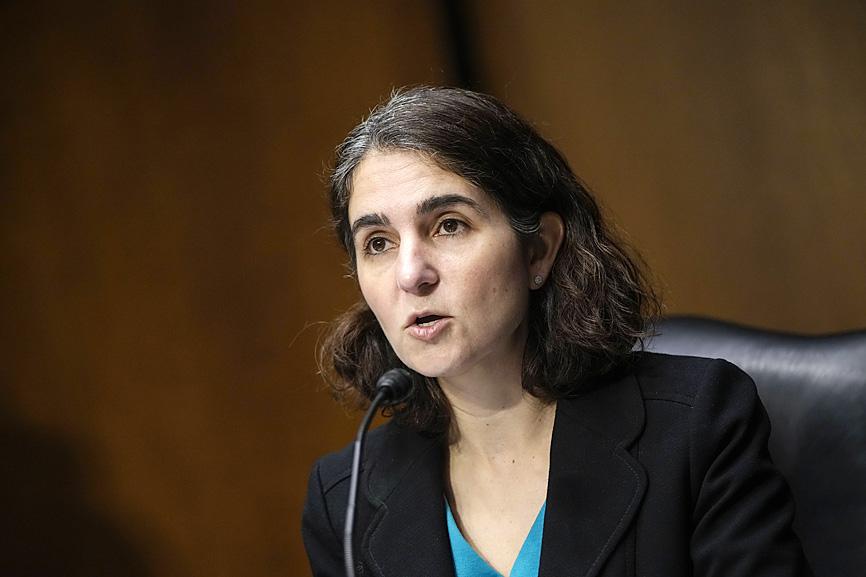A senior US defense official on Thursday told a US Senate hearing that Taiwan should enhance its asymmetric capabilities to defend against an attack by China.
US Assistant Secretary of Defense for Strategy, Plans and Capabilities Mara Karlin said that the war in Ukraine illustrates Taiwan’s need to be prepared.
“I think the situation we’re seeing in Ukraine right now is a very worthwhile case study ... about why Taiwan needs to do all it can to build asymmetric capabilities, to get its population ready, so that it can be ready as quickly as possible should China choose to violate its sovereignty,” Karlin told the US Senate Foreign Relations Committee.

Photo: AFP
She was responding to a question by committee Chairman Bob Menendez, who asked when the last time was that the US Department of Defense conducted an assessment with Taiwan of its defense capabilities and needs.
Karlin said that the US and Taiwan regularly discuss ways in which Washington can help Taipei build a military tailored to the threats it faces.
“It is absolutely a priority to ensure that Taiwan is getting the asymmetric capabilities that it needs, that is most appropriate,” Karlin said.
US Assistant Secretary of the Bureau of Political Military Affairs Jessica Lewis said that to offset China’s military superiority, Taiwan should focus on boosting its asymmetric capabilities, rather than acquiring more conventional military weapons.
Asymmetric systems, which have been used to great effect in Ukraine, are cost-effective, mobile, resilient and decentralized, Lewis said, citing as examples short-range air defense systems, naval mines and coastal defense and cruise missiles.
“Obviously, we don’t want there to be a conflict in Taiwan, but what they are doing is taking steps to address this issue,” Lewis said. “They’ve just created the establishment of an all-out defense mobilization organization, and they are working with our national guard as they develop this program.”
“Our support [for Taiwan] remains rock solid,” Lewis told the committee, which was seeking to learn about the US’ cooperation and assistance on external security, including the threat to Taiwan from China.
In Taiwan, Su Tzu-yun (蘇紫雲), an associate research fellow at the Institute for National Defense and Security Research, yesterday said that Taiwan should leverage cost-effective precision-guided munitions to bolster its counterinvasion asymmetric warfare capabilities.
Affordable precision-guided air-defense and anti-ship missiles would be the key to giving Taiwan an advantage over an invading force, he said.
Although Ukraine has leveraged asymmetric warfare against Russia in a land war, Taiwan would likely have to focus on sea and air engagements, necessitating a different approach to asymmetric warfare, Su said.
Despite the differences, the logic remains the same, in that “the key to asymmetric warfare is the difference in cost,” Su said.
Asked about Karlin’s remarks, a spokesman for China’s embassy in Washington, Liu Pengyu (劉鵬宇), said that some in the US have abetted forces for Taiwanese independence in a bid to hold back China’s rejuvenation.
“This would not only push Taiwan into a precarious situation, but also bring unbearable consequences for the US side,” Liu said in an e-mail.
Additional reporting by Reuters

Right-wing political scientist Laura Fernandez on Sunday won Costa Rica’s presidential election by a landslide, after promising to crack down on rising violence linked to the cocaine trade. Fernandez’s nearest rival, economist Alvaro Ramos, conceded defeat as results showed the ruling party far exceeding the threshold of 40 percent needed to avoid a runoff. With 94 percent of polling stations counted, the political heir of outgoing Costa Rican President Rodrigo Chaves had captured 48.3 percent of the vote compared with Ramos’ 33.4 percent, the Supreme Electoral Tribunal said. As soon as the first results were announced, members of Fernandez’s Sovereign People’s Party

MORE RESPONSIBILITY: Draftees would be expected to fight alongside professional soldiers, likely requiring the transformation of some training brigades into combat units The armed forces are to start incorporating new conscripts into combined arms brigades this year to enhance combat readiness, the Executive Yuan’s latest policy report said. The new policy would affect Taiwanese men entering the military for their compulsory service, which was extended to one year under reforms by then-president Tsai Ing-wen (蔡英文) in 2022. The conscripts would be trained to operate machine guns, uncrewed aerial vehicles, anti-tank guided missile launchers and Stinger air defense systems, the report said, adding that the basic training would be lengthened to eight weeks. After basic training, conscripts would be sorted into infantry battalions that would take

GROWING AMBITIONS: The scale and tempo of the operations show that the Strait has become the core theater for China to expand its security interests, the report said Chinese military aircraft incursions around Taiwan have surged nearly 15-fold over the past five years, according to a report released yesterday by the Democratic Progressive Party’s (DPP) Department of China Affairs. Sorties in the Taiwan Strait were previously irregular, totaling 380 in 2020, but have since evolved into routine operations, the report showed. “This demonstrates that the Taiwan Strait has become both the starting point and testing ground for Beijing’s expansionist ambitions,” it said. Driven by military expansionism, China is systematically pursuing actions aimed at altering the regional “status quo,” the department said, adding that Taiwan represents the most critical link in China’s

EMERGING FIELDS: The Chinese president said that the two countries would explore cooperation in green technology, the digital economy and artificial intelligence Chinese President Xi Jinping (習近平) yesterday called for an “equal and orderly multipolar world” in the face of “unilateral bullying,” in an apparent jab at the US. Xi was speaking during talks in Beijing with Uruguayan President Yamandu Orsi, the first South American leader to visit China since US special forces captured then-Venezuelan president Nicolas Maduro last month — an operation that Beijing condemned as a violation of sovereignty. Orsi follows a slew of leaders to have visited China seeking to boost ties with the world’s second-largest economy to hedge against US President Donald Trump’s increasingly unpredictable administration. “The international situation is fraught